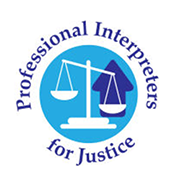PI4J promotes professional interpreters and translators who are members/registrants of recognised professional interpreting and translation bodies. Such professionals will at all times act in accordance with the high standards of competence and integrity.
These interpreters and translators are bound by stringent and robust codes of professional practice and conduct, which ensure their competence, reliability, accountability and security vetting by independently verifying their credentials and qualifications.
PI4J calls for:
-

The use of qualified interpreters and translators
Only qualified, experienced, vetted, and registered Public Service Interpreters and translators should be used to provide interpreting and translation in the public services, including the current (and any future) Language Services Framework Agreement and contracts.
-

Full consultation with the profession
PI4J should be consulted by public authorities regarding the provision of interpreting and translation services in order to inform the decision-making process and to ensure that outcomes have the support of the profession.
-

Sustainable terms and conditions be offered to interpreters and translators
Recognising that interpreting and translation are professional occupations will ensure the success of any contract and quality of service.
-

Independent auditing of quality and performance
Quality assurance should be paramount. Credible, independent scrutiny of contract management and adherence to its provisions is essential.
-

Independent regulators
Regulation and the maintenance of registers should not be in the hands of private providers: NRPSI is a fully independent regulator of the profession, paid for by the interpreters and run solely in the public interest. PI4J is of the view that the NRCPD should be similarly independent.
-

Minimum levels of qualification for interpreters and translators
Training, as well as language fluency, with a minimum entry-level qualification must be required with skills maintained and developed through a programme of Continuing Professional Development (CPD). Provision should be put in place to encourage the supply of Rare Language interpreters.
-

Statutory protection of title
A working group must be set up to examine the feasibility of introducing statutory protection for the title of Public Service Interpreter.
PI4J upholds the principle that reliable communication provided by qualified professional interpreters and translators is an essential resource which ensures that justice and human rights are upheld for non-English speakers and for deaf people.
PI4J opposes any action which undermines this principle and the risk which occurs if quality is sacrificed for profit, standards are dropped, and the quality of professional interpreting services is compromised in any way.
It is a matter of profound concern to PI4J that as a result of not receiving a fair market rate a significant number of experienced, qualified interpreters have left the profession.
